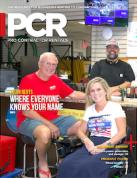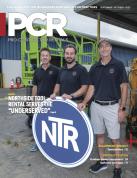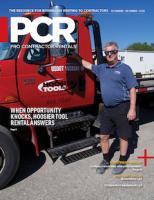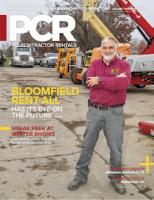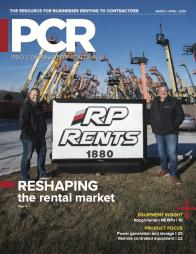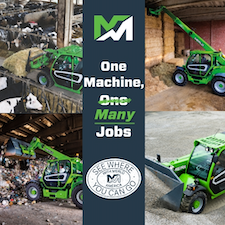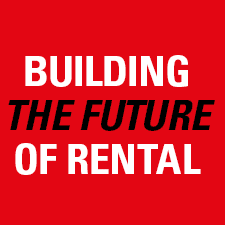Rental Center: Positioned to prosper
Road Machinery & Supplies Co.’s RMS Rentals division serves building and asphalt contractors in the Minneapolis area with a unique mix of equipment.
By Clair Urbain
In 1926, Michael Sill traded his role as a machinery salesman for Minneapolis-Moline to become an entrepreneur by launching Road Machinery & Supplies Co. (RMS).
 |
|
RMS Rentals purchased the last 100 Lull units that were manufactured. “Our customers like these units because they can lift heavy loads to high locations and their frame design allows them to push the load into place without moving the wheels. It’s a very popular rental item,” says Mike Sill II, CEO. “I think one of the things that makes us unique, especially when compared with the national chains, is that we are a blend of a rental model and a distribution model. ” (Photo at right) |
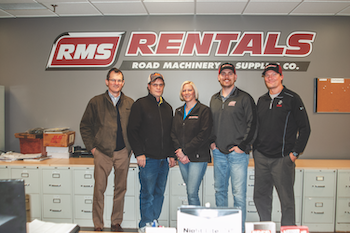 |
|
L to R: Some of the members of the RMS Rental team: Mike Sill, CEO; Brian Gaul, parts manager; Larissa Indrebo, rental manager; Scott Solberg, sales coordinator and Shane Friestad, rental coordinator. |
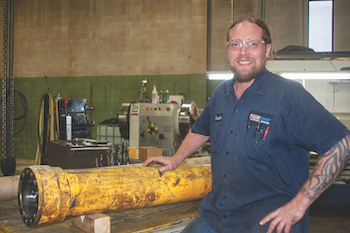 |
|
Brandon VanDeVeire, RMS Hydraulics foreman, refurbishes and repairs hydraulic cylinders for internal and external customers. |
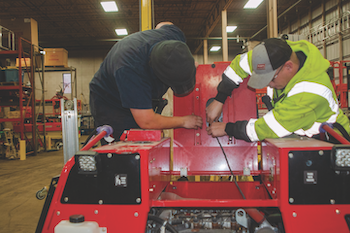 |
|
Technician Tyler Dubbels, left and yardman Jake Vonbank tackle preventive maintenance on some equipment coming off the busy summer season. RMS Rentals’ 55,000 square-foot building allows the rental division to store a substantial amount of equipment inside during Minnesota’s challenging winter months. |
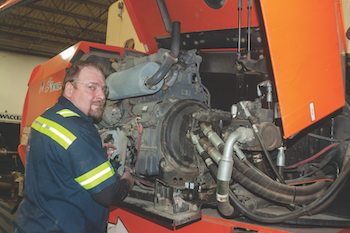 |
|
Jeff Grant, RMS Rentals technician, tackles boom lift repairs. The company establishes a training program with each technician, developing a game plan to get technicians certified in a timely fashion. |
The new company sold motor graders, culverts, snow fence and other supplies out of its location in Duluth, Minnesota. He managed his business through the difficult times of the Great Depression, then dealt with equipment and material shortages brought on by the World War II war effort. Steadily he continued to build the business.
In the mid-50s, Sill’s twin sons, Mike and Mitch, joined the firm. Mitch stayed in the Duluth area and son Mike pioneered to Minneapolis to expand the business. They picked up several lines – Michigan loaders, Blaw-Knox pavers, Link-Belt excavators, Euclid trucks and others.
“During that period of time, RMS grew into a statewide business,” says Michael M. Sill II, RMS chief executive officer and the third generation of family to run the business. He joined the company in 1988; in 1994, the twins split their business interests. “My dad and I kept the heavy equipment side,” Sill recalls.
Rental entrance
The firm’s rental division, RMS Rentals, opened its doors in 1999, but the company had focused on heavy rental units since the 1980s. “RMS was comfortable with rental with purchase options before it became commonplace,” Sill says. “However, we didn’t have a presence with light equipment.”
That began to change in the mid-’80s. “We had some interesting opportunities come to us during that time. The local Ingersoll Rand factory store became available and we acquired it. That included its air compressors, rock drills and small rollers.”
The biggest game changer for RMS was the opportunity to become a Komatsu dealer in 1983. “Komatsu came into North America with a proven, globally accepted quality product with a substantial price advantage over what was available in North America. Its product line brought us an excavator, wheel loader and dozer, all under one brand. In the late ’90s, Komatsu introduced utility equipment, and we knew we needed to reconfigure our light and utility equipment rental presence.”
In addition to its presence with small dirt contractors, RMS took on the Lull forklift account that allowed it to cater to building and masonry contractors. RMS Rentals became well-known throughout the Minneapolis-St. Paul area as a material-handling equipment and aerial lift provider. Sill says, “At our peak, we had 150 Lull telehandlers in our fleet. The Lull units at one time were manufactured locally in Eagan, Minnesota, and RMS Rentals enjoyed the highest market share in the country. When JLG purchased Lull, and subsequently exited the product line, RMS Rentals purchased the last 100 Lull units that were manufactured.
“Our customers like these units because they can lift heavy loads to high locations and their frame design allows them to push the load into place without moving the wheels. It’s a very popular rental item,” he says.
RMS Rentals also offers Potain tower cranes. “We offer assembly and disassembly service, which our customers appreciate. We have 90 percent utilization on that fleet,” he says. The fleet is rounded out with LeeBoy pavers, self-propelled buggies, various pieces of concrete finish equipment and compaction equipment.
The service difference
Drawing from its equipment parts and service roots, the rental division is extremely customer- and service-focused. The rental division has invested almost $20 million in more than 1,300 pieces of equipment; its parts inventory totals more than $1 million.
“I think one of the things that makes us unique, especially when compared with the national chains, is that we are a blend of a rental model and a distribution model. We rent several forklifts, boom lifts and scissor lifts, which tend to be rent-to-rent, but we’ll also write rental-purchase agreements, including on asphalt pavers. Not every market uses tower cranes like we do; we have the knowledge, capability and service component that others don’t offer. We set up the cranes on the customer job site, then help them disassemble and help relocate them,” he says.
Sill says the RMS Rentals’ service capability is an extension of the strong service commitment on RMS’ heavy equipment side. “We have a 55,000 square-foot building for our rental operation that includes five-ton cranes over the service bays. We dispatch technicians in field trucks and draw upon additional technicians from our heavy equipment side when needed to ensure we are responding promptly when times get busy. Our large building allows us to store quite a bit of equipment inside, which is important in this climate. Not many rental houses can offer the level of service that we can,” he says.
Another extension of RMS is the hydraulic cylinder repair shop, which is a great added-value service for its customers on the heavy equipment and rental sides of the business. “In addition to our own work, our Parts and Service sales group solicits cylinder repairs from a wide variety of companies,” he says.
RMS Rentals takes great pride in its service capabilities. “Our technician development is an important part of the service equation,” Sill says. “We have a dedicated technician recruiter who works with high schools to get students interested in technical colleges. He also works with those colleges to identify students who may be a good fit with our organization,” he says.
Once hired, RMS develops a training program for each technician to build new skills and obtain certifications for equipment. The recruiter also coordinates safety training and helps technicians craft a training path that is tailored to their specific needs and interests. “For example, if a technician is interested in working on LeeBoy asphalt pavers, they work together to develop a training track to get that technician certified,” Sill says.
Across all divisions of RMS, there are 350 employees; the rental division has 25 dedicated employees. RMS is fortunate to enjoy employee longevity and a healthy company culture. “We try to instill a family atmosphere at RMS Rentals. Our team hosts a number of cookouts during the year, and customers and vendors attend as well. From a business standpoint, we try not to micromanage,” Sill says.
Inventory philosophy
Sill says that unlike most of his competitors who won’t allow a customer to purchase from their rental fleet, RMS’ philosophy of flexibility means that its inventory is more varied in age. “We don’t follow the rules of daily depreciation like the big rental companies. It doesn’t make sense for the broad range of product that we have and the cold climate in which we operate. We are routinely adding new product to inventory because we retail more frequently. That often means our equipment is newer, better maintained, and is stored inside.”
The next 20 years
Sill believes equipment dealers and rental houses will need to become larger and have excellent access to even more capital in the future. “Dealers are getting bigger because access to capital is significant. You have to be able to support a big rental fleet in order to deliver the level of service customers demand. You have to invest in the delivery trucks and in our case, in technician training. The recruitment of technicians is a constant challenge,” he says.
He also believes having the right company culture is key to future success. “I would say that my formula for growth is driven by the culture that we have. We’re a family business and in our definition of family business, we treat our people like family. It’s an important philosophy for our management.
“We’ve made a number of acquisitions over the years and our family philosophy is attractive to company owners who have sold their businesses to us. Most want to ensure that they find a good home for their employees. If you develop a reputation based on respect, opportunity has a way of finding you,” he says.
Sill also believes that rental business will increase. “One of my great takeaways from the recession of 2009 was that when the economy slowed down, there was still activity and people chose to rent instead of buy. Sure, we like to sell new and used equipment, but by providing service and selling parts when times get slow, we can make a living on the parts, service and rental business. Rental is a critical component of that revenue stream; you can’t do it on parts and service alone. You need to have the service components to take care of the customers, to get the product where it needs to be at the right time,” Sill concludes.
This article appeared in the January-February 2020 issue of Pro Contractor Rentals magazine.
© 2020 Urbain Communications LLC. All rights reserved.




